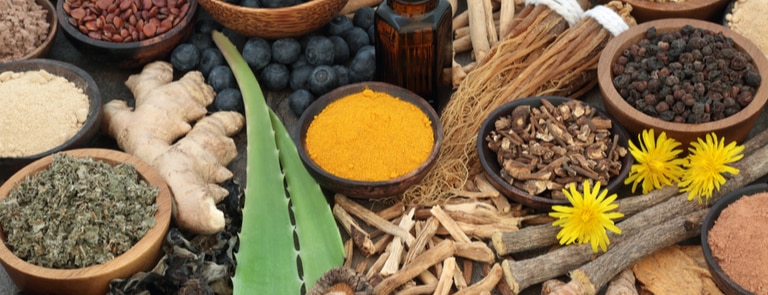10% off £35
Shatavari: overview, benefits, dosage, & side effects

Ever feel like your list of ailments is neverending?
You might be glad to learn that adaptogenic herb shatavari translates to “curer of a hundred diseases”.1
Shatavari is believed to support reproductive health and the menopause and can even help lift your mood. Could it be for you?
What is shatavari (& what does it do)?
Shatavari is a herb that’s been used for hundreds of years in Indian Ayurvedic medicine. Although it might not look like it, this brown root is a member of the asparagus family.
The special thing about shatavari is that it’s a natural adaptogen; it changes the way your body and brain respond to stress.
Adaptogens help you to “normalise” yourself when things get a bit much. They don’t cure your symptoms - they simply help you balance out the highs and lows.
Shatavari isn’t only used for stress and anxiety, though. We can’t say we’ve counted all “a hundred diseases”, but it’s certainly celebrated for a whole range of benefits!
Everything you need to know about adaptogens
Everything you need to know about adaptogens
The theory behind adaptogens is that they can help your body adjust to physical, chemical or biological stress. But how do they work?


What are the benefits of shatavari?
Read on to find out the benefits of shatavari...
-
It can help reduce anxiety
As we mentioned, shatavari is a natural adaptogen, which helps us to feel balanced in moments of stress. It’s thought to help regulate serotonin, the hormone that makes us feel happy.
While it can’t cure something like an anxiety disorder, shatavari is thought to help promote anxiety-reducing hormones.
A 2014 study found that shatavari helped rats produce healthy levels of serotonin and gamma-aminobutyric acid (GABA).2
These are the same hormones that humans use to feel calm - so consider a daily shatavari supplement or a little shatavari powder in your tea if you’re struggling to switch off.
-
It may help lower blood sugar
Certain compounds in shatavari stimulate insulin production, meaning it shows potential when it comes to treating conditions like diabetes.3
Insulin helps your body use sugar (glucose) for energy. People with diabetes may not naturally produce enough insulin, which is why their blood sugar levels can be too high.
While there is growing research into this, it's important you follow your GP's advice or consult a healthcare proffessional.
-
It has antioxidant properties
Antioxidants are the powerful compounds that help protect us every day. You’ll find them mainly in plant foods - and shatavari is no exception.
Antioxidants help protect against free radical damage and oxidative stress. You can’t avoid free radicals entirely, but you’ll experience greater damage with smoking, UV exposure, and a poorly balanced diet (to name a few).
Shatavari contains 3 different antioxidants: asparagamine A, racemosol, and a new antioxidant discovered in the shatavari root called racemofuran.45
Handpicked content: The benefits of an antioxidant-rich diet
-
It can help ease symptoms of menopause
Many people look to natural remedies when they begin their menopause - and shatavari has gained a reputation as a wonder product.
In Ayurvedic medicine, shatavari is known as the “female rejuvenator” and is believed to help combat heat and dryness - both uncomfortable aspects of the menopause.
Many menopause symptoms happen due to low oestrogen. Shatavari contains phytoestrogens, a plant-based, dietary form of oestrogen.6
Because of this, it may help ease menopause symptoms like:
- Loss of energy
- Hot flushes7
- Night sweats7
- Vaginal dryness8
- Insomnia8
as well as helping to balance the hormonal and physical stress during this time.
Handpicked content: 11 natural remedies for menopause & symptoms
-
It may help keep coughs and colds at bay
Always sniffling?
Early evidence suggests that shatavari supports your immune function, which gives your body the strength to fight off illnesses.
A 2015 study found that it increased the percentages of T cells (a type of white blood cell responsible for immune response) by 31.5% in mice after 1 week of oral doses.9
Earlier research, published in 2004, found that shatavari root extract increased the antibodies for a strain of whooping cough, and the animals treated recovered faster than their non-treated counterparts.10
Handpicked content: Immunity guide: supporting your immune system
-
It may support female reproductive health
Some say “shatavari” translates to “curer of a hundred diseases”. Others say it’s closer to “she who has a hundred husbands”!
It won’t surprise you, then, to know that it’s been used for women’s fertility and sexual wellness for hundreds of years.
As well as helping to relieve menopause symptoms, the oestrogen regulators in shatavari are believed to alleviate:
- Menstrual cramps
- Irregular or heavy periods
- Bloating
- Mood swings and irritability associated with PMS
It’s also celebrated in Ayurvedic medicine as a fertility aid.
Low cervical mucus is one reason people may struggle to fall pregnant. Shatavari contains mucilage, which supports the mucous membranes and may help to line and protect the cervix.11
And, if your libido needs a boost, research suggests that shatavari is an effective aphrodisiac. Its estrogenic properties can help regulate sexual desire and improve symptoms (like vaginal dryness) that might make sex less comfortable.
Plus, its adaptogenic nature can help you de-stress (which might be another reason you’re not in the mood).
-
It can help ease an unhappy gut
Shatavari has been effective in preventing stress- and NSAID-related gastric ulcers in animals and is commonly used as a remedy for diarrhoea.12
It’s been found to increase activity in the enzymes lipase and amylase, which respectively break down fats and carbohydrates for digestion.13
How can I take it?
Shatavari supplements come from the root of the plant. It’s most commonly taken in a powder or tablet form, but you can also find liquid shatavari extract.
There’s no official dosage for shatavari, so you should always follow the instructions on your supplement label.
You’ll often find it combined with other herbs and minerals (particularly as a women’s health supplement).
Who shouldn’t take shatavari? Are there any risks?
Avoid shatavari, or consult your doctor, if any of the following apply:
-
If you’re pregnant, breastfeeding, or trying to conceive
There’s ongoing research as to whether shatavari is safe for pregnancy. Ayurvedic medicine considers it safe for long-term use, even during pregnancy and breastfeeding.15
However, many other sources agree that you shouldn’t take shatavari if you’re pregnant or breastfeeding until there’s conclusive evidence to prove that it’s safe.
-
If you have a kidney or heart disease
You should always consult a doctor before use if you have any kind of heart or kidney disease.
-
If you’re allergic to asparagus
Shatavari is a member of the asparagus family - so it’s not safe for anyone with an asparagus allergy. You might also be likely to have a shatavari allergy if you’re allergic to onions, chives, or garlic.16
Even if you don’t think you’re allergic to shatavari, stop taking it straight away if you experience:
- Difficulty breathing
- A rash
- A fast heart rate
- Itchiness
- Dizziness
-
You experience low blood sugar / take blood sugar-altering medication
Since shatavari can lower your blood sugar levels, you shouldn’t take supplements if you’re already prone to low blood sugar levels.
You should also consult your doctor if you’re on any medication to decrease your blood sugar levels.
-
You take diuretic medication or herbal remedies
Shatavari already has diuretic properties, so don’t combine it with any other medications or herbal remedies that increase urine production.
Even if you don’t experience any of these, you should always speak to your GP before starting to take shatavari supplements.
It’s also worth noting that shatavari is a “guru” (heavy) substance and is commonly used to help with diarrhoea, so it may cause constipation and increased gas in some people.
The final say
You might benefit from shatavari supplements if you’re experiencing:
- PMS, period pain, or menopause symptoms
- Stress and anxiety
- Diarrhoea
- Frequent coughs and colds
- Low libido
and so much more…
- https://www.webmd.com/vitamins-and-supplements/are-there-health-benefits-of-shatavari-powder
- https://link.springer.com/article/10.1007/s10571-014-0035-z
- https://joe.bioscientifica.com/view/journals/joe/192/1/1920159.xml
- https://www.webmd.com/vitamins-and-supplements/are-there-health-benefits-of-shatavari-powder
- https://pubmed.ncbi.nlm.nih.gov/15478181/
- https://www.ncbi.nlm.nih.gov/pmc/articles/PMC6390141/
- https://www.tandfonline.com/doi/full/10.3109/13697137.2014.966241
- http://www.panchakarma.com/the-herb-called-shatavari-a-gift-for-women-a-267.html
- https://pubmed.ncbi.nlm.nih.gov/19038322/
- https://www.sciencedirect.com/science/article/abs/pii/S0378874104000212?via%3Dihub
- https://www.thehealthsite.com/pregnancy/reasons-shatavari-is-a-wonder-herb-for-women-trying-to-get-pregnant-d1215-356314/
- https://pubmed.ncbi.nlm.nih.gov/16387694/
- https://www.thieme-connect.de/products/ejournals/abstract/10.1055/s-0028-1099871
- https://pubmed.ncbi.nlm.nih.gov/16357948/
- http://www.bioline.org.br/request?ms03025
- https://www.webmd.com/vitamins/ai/ingredientmono-1167/asparagus-racemosus
The advice in this article is for information only and should not replace medical care. Please check with your GP or healthcare professional before trying any supplements, treatments, or remedies.
Before taking any supplements or minerals, it's best to make sure you're getting all the nutrients through your diet first. Food supplements must not be used as a substitute for a varied and balanced diet and a healthy lifestyle.














